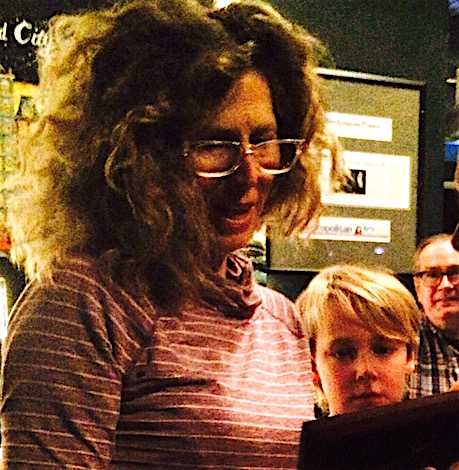Arts & Entertainment
Sophie’s choice
‘90s hitmaker returns after seven years with new album


Sophie B. Hawkins released her first studio album in seven years last week. (Photos courtesy Trumpet Swan Entertainment)
How hard is it in this day and age to bounce back from a pop music career misstep? One likes to think pop culture — America ultimately voting with its pocketbook of course — eventually rewards and rediscovers the deserving.
One thinks of Kelly Clarkson who managed a comeback after the ill-advised downer (though it still went Platinum) 2007 album “My December.” And love her or hate her, Mariah Carey beat the odds with the monster-selling “Emancipation of Mimi” after her epic “Glitter” failure (both film and soundtrack).
But what if your supposed misstep isn’t even a bad album? Sophie B. Hawkins was well on her way to establishing distinguished career by the end of the ‘90s. She was red hot right out of the gate — “Damn I Wish I Was Your Lover,” which hit No. 5 on the Billboard Hot 100 in 1992, is a defining song of the era. She was nominated for the Best New Artist Grammy that year (co-nominated with Billy Ray Cyrus, Kriss Kross and Jon Secada; Arrested Development won). She survived the sophomore jinx with another mammoth hit “As I Lay Me Down,” a VH-1 staple from her second album “Whaler” that peaked at No. 6 during a 44-week run on the Hot 100 and a whopping 67 weeks (six at No. 1) on the AC chart. Unless you were in a convent that year, you heard it many, many times.
With that kind of start, the sky was conceivably the limit and expectations ran extremely high for her 1999 follow-up, “Timbre.” But trouble loomed — it’s a famous story, actually: Hawkins’ then label (Sony) only reluctantly released first single “Lose Your Way” with a banjo accompaniment. They argued it was poison for pop radio. Hawkins said it was essential. Though re-released independently in 2001 and followed by an indie follow-up called “Wilderness” in 2004, Hawkins lost her commercial, but not her artistic, footing. “Wilderness” turned out to be an unfortunately apt title — she spent years wandering.
Perhaps this wasn’t a total surprise, though. Anybody who’d paid attention knew Hawkins had a wild streak. She shimmied and writhed like a woman possessed on her duet with Melissa Etheridge on the latter’s VH-1 special in 1995 with a slate of then-hot female singer/songwriters like Joan Osborne, Jewel and Paula Cole. Those who caught Hawkins in concert knew of her penchant for the unconventional. As her audiences got smaller, her jeans got more shredded, her stream-of-consciousness stage meanderings more fluid. She wrangled memorably with Howard Stern about why she doesn’t shave her legs.
Though she’s long shunned labels for sexual orientation, the fact that she’s been in a same-sex relationship with filmmaker Gigi Gaston for several years (Gaston’s “The Cream Will Rise” follows Hawkins on an early tour) is one of the more conventional aspects of her persona. And it’s easy to forget that her wildly eclectic albums are full of intricately crafted and sometimes epic, sometimes disarming power pop that at times rivals Joni Mitchell’s best stuff for complexity and lyrical depth — check out “Mysteries We Understand,” “Only Love” “Help Me Breathe” and “I Need Nothing Else” especially.
Her hit singles are only part of the story. An early MusicHound review said, “Dig (further) than (the hits) and her abilities to seamlessly weave in and out of jazz, folk and dance, all driven by a kind of tribal percussion sensibility (emerge).”
But Hawkins, now 44, is starting to sound her age. Not vocally — her singing still has the luster that struck her chart gold all those years ago, but her insights during an hour-long phone chat last week show a woman who’s thought long and hard about life, pop culture popularity cycles, music making in the Internet age and much more. With no apparent time constraints, Hawkins gamely goes anywhere the questions take her and beyond, from hair tips and why she’s a dog person to the deeper story behind the banjo battles and her still-complicated relationship with her mother (explored memorably in “Cream”). The impetus for all this is her interminably delayed new album “The Crossing,” her first collection of new material in seven years, which dropped last week.
“People were always telling me, ‘Oh, you sold out with ‘Tongues and Tales,’ or, ‘Oh, you sold out with ‘Whaler.’ I’m not saying ‘Tongues and Tales’ was just art for art’s sake, but that was really the best I could to try and reach people,” Hawkins says. “Those albums were the least weird I could possibly be. You want your music to reach people, you want it to get out there to as many as possible, otherwise it’s too isolating. It’s like masturbation, you’re not doing it with anybody.”
Hawkins considers herself part of a group of ‘90s women singer/songwriters — she mentions Paula Cole and Tori Amos as peers — who barely “squeezed through” the music industry gate before the doors shut altogether, from the advent of file sharing to endless label buyouts that left precious few major players in the game. Yes, there are still women hitmakers — Rihanna, Adele — but they’re few and far between and getting younger all the time.
“I think everybody knew what was going to happen, the chilly winds were already blowing,” she says. “I felt with the first album like, ‘Wow, I really got away with something’ in spite of all this. Then with ‘Whaler’ it felt like that again, although that was really the beginning of the fight. … In the ‘90s, it really started turning against the individual artist into this totally corporate thing in every way. It was like, ‘Oh, I’m with this group, I’m with that group, this is Sophie’s sound, this is the lesbian sound, the country artist, the right wing, the left wing — I feel like several of us just barely squeaked through in spite of all that.”
And yes, some of that line of thinking is what’s led Hawkins to shun traditional LGBT labels.
She admits she and Gaston have been in an exclusive relationship (Gaston is also her manager), but says a lack of general perception of nuance causes her to avoid certain language.
“It’s because nobody listens,” Hawkins says. “They just want to say it, and shut up and not hear any more about it. I love the word bisexual but it has such a negative connotation, I don’t know why. It’s like this big, scary thing for people so I’ve tried to come up with something that’s what I really think I am … I’m definitely not heterosexual or homosexual, I love men and women equally and passionately. I’m just having a relationship right now with a woman and I think there are very few men I could have a relationship with. I’m a very singular person. I’m committed to this woman, but if I were not, I’d probably be alone.”
The years since “Wilderness” have not been inactive for Hawkins. She became a mother — her son with Gaston, Dashiell, is 3. She popped up at the Grammys pre-show as a presenter, campaigned avidly for Hillary Clinton’s presidential campaign, released several singles along the way including one (“The Land, the Sea and the Sky”) as a benefit for the Waterkeeper Alliance, an environmental group.
She released a live album and her song “Life is a Bomb” was on the soundtrack for the 2011 Garry Marshall film “New Year’s Eve,” a feat Hawkins says was wildly against the odds. She also tweaked “The Crossing” endlessly as the years went by and various proposed release dates came and went. Hawkins says it’s “a miracle” the album came out at all.
She also worked with Gaston on a musical for Kristin Chenoweth that’s on hold until Chenoweth’s producer of choice is available and she has high hopes for an October musical in Los Angeles (Hawkins lives in Venice, Calif., and has been on the West Coast for more than a decade) in which she’ll star as Janis Joplin.
Hawkins says she knew instinctively, she was supposed to do the Joplin piece.
“My reaction was just, ‘Yes,’ and I never say yes to anything right away. I just think there’s something I can do with Janis that will speak to every creative person out there who feels overlooked or treated in a way that’s not fair. … If we can get this ball in the basket, I have a good feeling about this, I think it could be a slam dunk. It will be so relevant to now, it really gives me a freedom I cannot even tell you.”
Hawkins guesses, counting the Chenoweth musical and “The Crossing” material, she’s written about 300 songs in the last seven years. The album will include acoustic remakes of “Damn” and “As I Lay Me Down.” Hawkins has a distribution deal with EMI for the release.
Hawkins says she’s a huge dog lover because she could never have one as a kid. She loves them because there’s “no barrier” to their affection and presence.
Of her trademark abundant tresses, Hawkins says her only hair care tip is to avoid washing it as much as possible. She insists hers looks best when it’s been weeks since the last shampoo.
“That’s when I always get the most compliments, people saying ‘Oh, you have such great hair.’”
She’s also realistic about “The Crossings” commercial prospects. She says she’ll never stoop to giving her music away but realizes the chances of duplicating her early chart success are practically nil.
On one hand, Hawkins says her art (she paints too) is something she “couldn’t not do.” Conversely, she says it’s Gaston who has urged her to continue against increasingly difficult industry and commercial odds.
“She’s so much more than a manager,” Hawkins says. “Things bother her more than they bother me. Oh, believe me, I would have just gone away by now and written and painted by myself if it weren’t for her. I don’t think I could have survived but she tells me, ‘You’re not giving up, you’re a great artist, it kills me that people don’t see this.’ She really takes it on as one of her missions.”
So in hindsight, was the banjo battle worth it?
Hawkins says the story has gotten oversimplified as a kind of cautionary tale for supposedly overambitious pop singers — as in, “Remember Sophie B. Hawkins? Look what happened to her.”
She says it was more an issue of increasing pressure to write songs in huge groups of collaboration Hawkins found unwieldy and artistically stifling. She says she would have agreed to remove the banjo line for the radio version and kept it on a remix or B-side version (“Believe me, all those scenarios were discussed”), but push came to shove when label execs put their foot down over her using it for a live TV appearance.
“It was really the straw that broke the camel’s back,” she says. “It was such a clear thing to me. They were taking away my horse, in a way. I thought, ‘I can’t ride into battle without my horse. I can’t win without the horse.’ It just made me realize we weren’t on the same team anymore. … They were no longer rooting for me to win, they were trying to destroy me.”
Hawkins says she’s learned to find rewards in non-traditional places. Even though her relationship with her mother is still every bit as complicated as it was portrayed in “Cream,” Hawkins says there are sparks of healing and inspiration there too.
“There are artistic people out there struggling who never make at all,” she says. “So when somebody tells me they get it, it’s like winning an Oscar. My mother called me the other day and told me she’d listened to the new album. She said she’d felt it, whatever it was, this profound thing in the music. If your parents are alive and you get that, that’s my Grammy.”

They ran like the wind, broke the tape at the finish line, and clutched their chest with the broadest smile on their face. Then Nikki Hiltz collapsed to the track, having set a new record in the 1,500-meter race at the U.S. Olympic track and field trials and earned a spot on Team USA.
As the realization sank in that they would be representing the U.S. in Paris as an out transgender nonbinary athlete, what the Paris-bound Olympian did next was to scribble a message of LGBTQ representation on the last day of Pride Month, writing with a red marker upon the glass of the camera that records each athlete’s signature on a whiteboard:
“I ❤️ the gays,” they wrote, and above it, they signed their first name.
Hiltz, 29, finished the race on Sunday at the University of Oregon’s Hayward Field in first-place with a final time of 3:55:33, breaking third-place finisher Elle St. Pierre’s 2021 record of 3:58:03.
Hiltz credited St. Pierre, the top-finishing American and third-place finisher in the women’s 1,500 at the Tokyo Olympics, with motivated them and the other competitors to race faster. With a first lap time of 61 seconds, St. Pierre led the race for the majority of its duration. St. Pierre and Emily Mackay, who placed second, also both earned spots in the Paris Olympics.
“If someone would have told me this morning that 3:56 doesn’t make the team, I don’t want to know that. I’m just in the race to run it and race it and that’s what I did,” Hiltz said after the race. The Santa Cruz native who came out in 2021 as trans nonbinary told NBC Sports that the accomplishment is “bigger than just me.”
“I wanted to run this for my community,” Hiltz said, “All of the LGBT folks, yeah, you guys brought me home that last hundred. I could just feel the love and support.”
On Monday, Hiltz reflected on the race and how they became an Olympian in a post on Instagram.
“Woke up an Olympian. 🥹 Yesterday afternoon in Eugene Oregon a childhood dream of mine came true. I’m not sure when this will fully sink in … All I know is today I’m waking up just so grateful for my people, overwhelmed by all the love and support, and filled with joy that I get to race people I deeply love and respect around a track for a living. 🙏”
Hiltz also shared a photo with their girlfriend, runner Emma Gee, and captioned it: “Remember in Inside Out 2 when Joy says “maybe this is what happens when you grow up … you feel less joy”? Yeah I actually have no idea what she’s talking about. 🎈🌈🤠🦅🥐🇫🇷”
They shared photos in their new Team USA garb, too.
While they will be the first out trans nonbinary member of the U.S. track and field team, Hiltz will not be the first nonbinary Olympian. That honor goes to Quinn, who played soccer for Canada in Tokyo and holds the record as the only nonbinary athlete to have won a gold medal. So far.
Many of the posts by Hiltz, Team USA and others have been trolled by bigots and ignoramuses who have mistaken them for a trans woman who was presumed to be male at birth and transitioned genders. Right-wing outlets and anti-trans activist Riley Gaines have commented on their victory and questioned their gender identity and decision to compete against cisgender women.
A female who identifies as trans earned a spot on the U.S. women’s Olympic team.
I wonder why she didn’t try out for the men’s team. It’s almost as if she understands she would never be able to compete or succeed at same level against the men.
Tellinghttps://t.co/M5Lj9G0aEi
— Riley Gaines (@Riley_Gaines_) July 2, 2024
But in the spirit of the late Marsha P. Johnson, who famously said the “P” stood for “pay no mind” to the haters, Hiltz shared a photo of a handwritten motivational note to themself, which ends: “I saw a quote online the other week that said, ‘respect everybody, fear nobody,’ and that’s exactly how I’m going to approach this final. I can do this.”
And they did.
a&e features
Rehoboth’s Purple Parrot still soaring after 25 years
Owners Hugh Fuller and Troy Roberts reflect on keys to their success

Two buildings, one romance, and 25 years later, the Purple Parrot is busy as ever.
If the tropical purple paint covering the outside with rainbow flags and walls covered with love notes, affirmations, and drunk wishes scribbled on dollar bills don’t indicate it already, the Purple Parrot is an institution in Rehoboth. The gay-owned and operated fixture is celebrating its 25th anniversary this year.
The Blade sat down with owners Hugh Fuller and Troy Roberts of the Rehoboth establishment to discuss the past 25 years and plans for the future.
Fuller and Roberts, both gay, have been working together since before the Parrot was even an idea. Fuller was a co-owner of the Iguana, another restaurant and bar in the town.
“I was in the Iguana first with another business partner,” Fuller said. “I was going to get out and move up to Pennsylvania with him [Roberts]. He decided that he was going to come down and said, ‘Well, what if I go in with you at the Iguana and we do it together?’ And I was like, ‘Alright,’ so we did, and it just snowballed from there. We were always in the restaurant business together from the beginning.”
“Yeah, that was really luck, too,” Roberts began. “Because-”
“Because Grindr wasn’t around then!” Fuller interjected, laughing as Roberts began to roll his eyes and smile.
“I had a small place up in York,” Roberts continued. “Selling that kind of gave us some money to buy the other guy out. We just had friends supporting us and helping us along the way and it just kind of worked.”
“Kind of worked” would be an understatement. The pair moved on from the Iguana and opened the Parrot. Then, after opening the Parrot, they decided to shift locations to a larger location down the street to accommodate the growing demand. Then in 2010, the Parrot expanded again, adding the land behind the Rehoboth Avenue location, which provided an additional 950 square feet as well as giving patrons access to Wilmington Avenue.
The bar and restaurant, which serves American cuisine with a beach flair, has always focused on being a welcoming space to all regardless of sexuality, gender, race, nationality, or identity. This, the duo explains, is one of the reasons why the restaurant has had such a lasting impact on the Rehoboth restaurant and gay communities.

“Back in the ‘90s when we first opened up, the amount of straight crossdressers that would come were like, ‘Oh, are we allowed to come in? Are we welcomed into a place like that?’ And we were like ‘Everybody that walks on this planet is welcome here!’” Fuller said. “Those are the kinds of things, you know, where people just felt comfortable. They would get stared at out on the street, but inside they would walk around and feel like they were in their own skin. It was just really cool to see.”
The feeling of acceptance has been a crucial part of the Parrot’s success.
“I got an email a couple of days ago — probably two weeks ago about a woman bringing her daughter down,” Roberts said. “She’s 16 and was bullied through school — hard times, depression, tried to harm herself a couple of times. It was just really sweet that she reached out and she’s like, ‘My daughter was a completely different person when I brought her into your bar. Everybody treated her nice — the bartenders, the waitstaff, I mean, everybody was friendly. She just doesn’t experience that often being an out 16-year-old lesbian. We just can’t even thank you enough.’ It’s those kinds of things that we get often.”
“[The mother] mainly wrote it because we put the Pride flag on the Parrot’s Facebook wall,” Fuller added.
The colorful lights, disco balls, and staggering number of dollar bills stapled to the walls highlight that the Rehoboth community has embraced the Parrot. It’s not uncommon to see a group of gay patrons sitting at the bar in bathing suits sipping on orange crushes and talking about their day at Poodle Beach while a bachelorette party belts out Lady Gaga on karaoke night in the room next door. That is the vibe Fuller and Roberts have curated — a fun and friendly tropical oasis in the middle of Rehoboth Avenue.
A crucial element of this curated vibe, the pair point out, is treating employees and guests with respect. When asked what they have learned that helped them be so successful over the past 25 years, Fuller and Roberts said the same thing.
“Patience, organization, and treating people well,” Roberts said.” I think that’s probably one of the bigger of the three — you treat them well and they treat you well. I think it’s just a mutual respect.”
“It took me about 30 years to learn that it’s not just all about work,” Fuller said. “I used to bust my butt in there all the time and the focus was [on] the restaurant. I know [Roberts] said patience, I would say mine was being patient too because I learned going in that it’s easier to deal with your employees without shouting at them. It took me a little while to get through that.”
He added that compensating staff fairly was also one of their keys to success.
“Before we take a nickel out of our business, we put $1 back into our employees’ pockets,” Fuller said. We want the business to survive and it has been incredible.”
Fuller added that this sentiment, of having patience and treating everyone with respect, goes both ways — it applies to the Parrot’s patrons as well.
“If you leave the Parrot angry, it’s your own decision,” Fuller explained. “If we don’t make you happy there, it’s because you’re choosing not to be happy. We will go out of our way to correct anything and everything that we can. So if you leave [unhappy], it’s not because we couldn’t do it. It’s because you didn’t want us to.”
The two discussed their history together — anyone who has them interact can see their spirited energy and appreciation for each other.
“Troy and I used to be a couple when we first opened, and we were together for about 10 years,” Fuller said. “And then we kind of went our separate ways, but the restaurant kept us in very close contact. Sometimes I think we’re probably closer than most couples are because of the way that the restaurant has us tied together.”
“Even during the worst of it, we never stopped communicating on a daily basis,” Roberts added. “Obviously, you can tell by his personality why that all went south,” he said laughing.
“Well, you can tell by the way that he looks why it went south.” Fuller jabbed back, also laughing.
“Hey!” Roberts replied.
“I wasn’t gonna continue dating my grandfather!” Fuller joked.
Despite the end of their romantic relationship, there was still clear evidence of perpetual good energy between the business partners. The two then started to reminisce about the past 25 years and the struggles and successes they overcame to reach this milestone.
The pair mentioned the two biggest struggles they have faced in the past quarter century. One was when Rehoboth Avenue was dug up for the Streetscape improvement project, and the second was the 2008 recession.
“We were refinancing our houses several times to keep it afloat there for a little while,” Fuller said.
“But hey, we got nice sidewalks now!” Roberts added. “So that’s good.”
It’s not just the customers who grew up with the Parrot; so did the staff.
“I mean one of the kids who bussed for us is now our dentist,” Fuller said.
“One of the busboys from the Iguana days, he’s our dentist now,” Roberts explained. “They actually started dating in high school while working together at the Iguana. One of them followed us to the Parrot and her daughter just worked for us two summers ago as a host. He’s our dentist, and they’re still local. We just sold him a house over in Lewes, because we’re both Realtors on the side. When you look back at that, you’re like, ‘Oh, my God, you were just a kid. And now you have a kid graduating college!’ It goes fast.”
It seems that many of the staff have a soft spot for the Parrot, and for good reason. An important aspect of keeping their employees happy is supporting them. At first, it was trips to Disney World with some of the servers and renting out the local waterpark to give kids time to enjoy the summer. Then it became Christmas bonuses, which are not common in the food service industry.
The Parrot helped raise more than $10,000 for one of their employees dealing with fallout from the war in Ukraine.
“One of our bartenders being from Ukraine, when all that went down, amazingly, how he was able to bring a lot of his family over,” Roberts said. “And until they actually got grounded, he had places for them to stay all lined up.”
“The reason that he was able to get them over is because we did a fundraiser at the restaurant and our customers raised over $10,000 to help sponsor his family and one of our other employees’ families,” Fuller said. “They brought them all the way up through Mexico and into the country and now they’re here with citizenship cards and working for us. We got them houses and apartments too.”
“We don’t care what they are, whether they’re straight, Black, Chinese, Mexican. It’s like the Benetton of Rehoboth in here,” Fuller added. “It’s the United Nations. We support everybody and we’re not afraid to show our support for everybody.”
In addition to reminiscing about some of the good things the restaurant has done for its employees, they both talked about notable guests of the Parrot.
“My mind went right to the guys from Manhattan, who would always come down,” Roberts said when asked if any guests have stuck out to him over the past 25 years. “They just happened to find us. They had never been to Rehoboth before. They walked into the original Parrot and had every single year after that until two of them passed away. It just became like a yearly week, then it turned into two weeks, and then it turned into two times a year. And it was all just because they came to one bar, and had so much fun. They would sit there all day, all night, go home take a nap, and come back for dinner. And it was just their place.”
They have faced some objections from those who were not as receptive to their tolerance of different people.
“We get the same hate that everybody else does — the same hate that the city got when they put the rainbow crossings in and the flag up,” Fuller said. “I was just telling Troy about a conversation I had yesterday with a guy. The front of our business for Pride month has flags on it and says ‘Happy Pride.’ And he said, ‘I was going to come in here but I see you’re supporting the gay community with your rainbow flags.’ And I said ‘Yes.’ And he goes, ‘Well, I don’t see why you don’t have flags for veterans.’ And I said,’ Well, as a veteran, I can tell you that we don’t serve to be recognized, we serve to protect and to give you guys your freedom. It’s not something that we want recognition for. But there is a flag, the American flag, that flies over the top of our business every day to represent the veterans of this country.’”
Despite the opinions of some who are less than welcoming of the LGBTQ community, the Purple Parrot will always be a safe space to celebrate, the two affirmed. And celebrate they will.
The Parrot already hosted one party to celebrate the milestone of the bar early in the summer, but will throw an even bigger bash at the end of the season to commemorate the history and hard work that has gone into making the Parrot ‘fly.’
“On May fifth we had a big party,” Fuller said. “We’ll have another one at the end of the summer in September. We did one at the beginning and then we’re going to do a really big one at the end of the summer. The first celebration, that weekend, turned out to be a little rainy, and misty so it wasn’t as big as it could have been. It was packed inside but it wasn’t packed outside like it normally is. We usually do a full cookout barbecue, all that stuff and we’ll do that again at the end of the summer. We’ll have another one of those with DJs. I am not sure about a drag show, but we’ll probably have something because the girls are trying to get something together. We don’t want to spoil anything but there will be a surprise.”
When asked to give their final thoughts on owning and running one of Rehoboth’s most successful businesses as gay men, the two made it clear that it has to be a safe and welcoming space for all for it to succeed.
“I think you have to be all-inclusive,” Roberts said. “I don’t think in today’s world you can just really limit it to the gay community. You have to be gay-friendly, and accepting as well. And I think that helps because it gets non-gays in there and everybody just starts to get along. It becomes more accepted and then becomes the norm.”
Fuller agreed but emphasized being true to one’s character in collaboration with being inclusive is the key to their success.
“Being gay isn’t who we are, you know, it’s what we are,” Fuller said. “You can’t be afraid to be you. … If you’re going to open up a business, you want to make sure you lean on the community, because the community is going to be your biggest support. And that’s how we definitely lean on the gay community.”
The Purple Parrot is located at 134 Rehoboth Ave. in Rehoboth Beach and is open Monday through Saturday from 11 a.m. to 1 a.m. and is open from 9 a.m. to 1 a.m. on Sundays. For more information, visit their website at ppgrill.com.


The 2024 New York City Pride Parade wound through the streets of Manhattan and past the historic Stonewall Inn on Sunday, June 30.
(Washington Blade photos by Daniel Truitt)
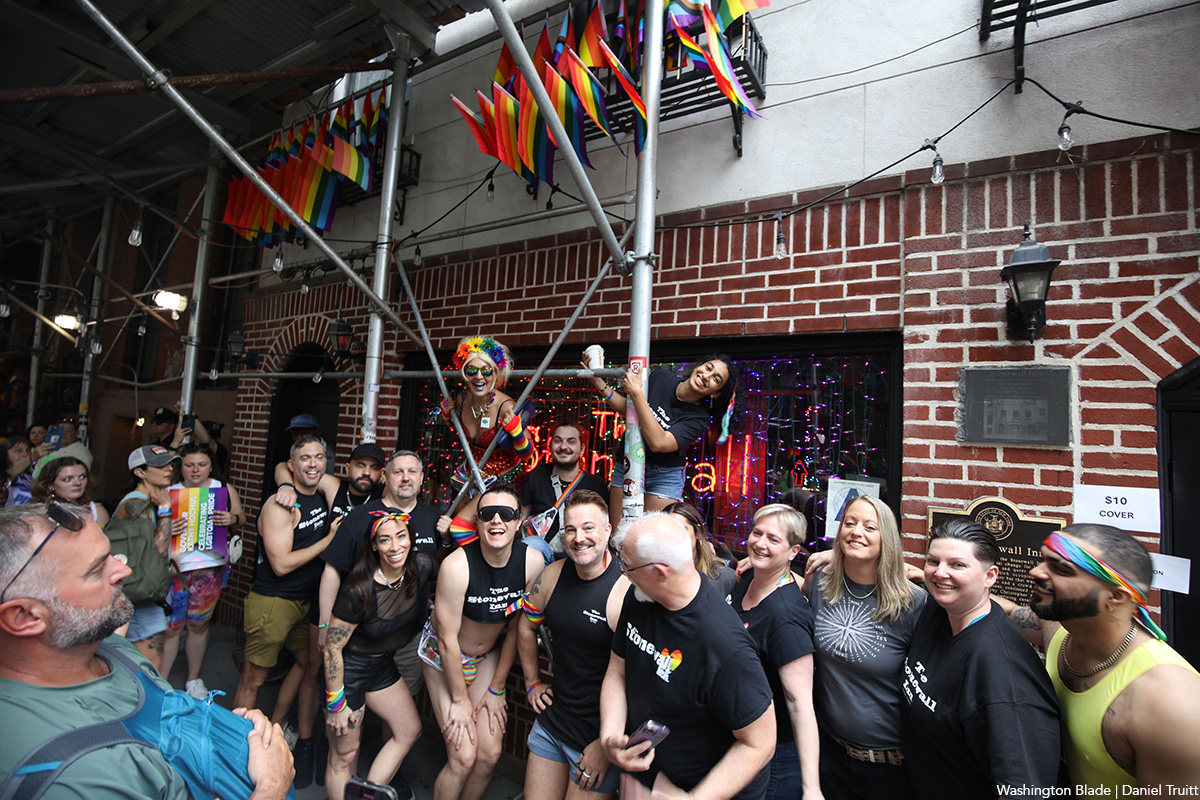
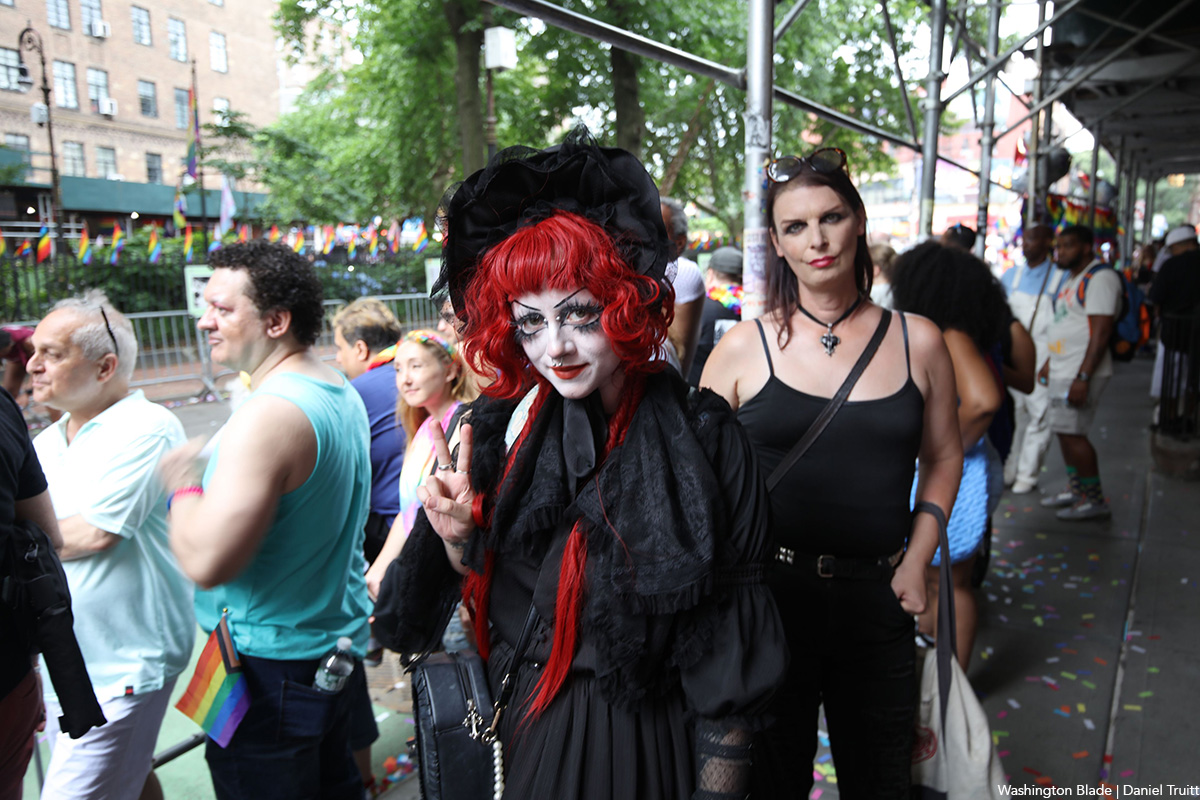
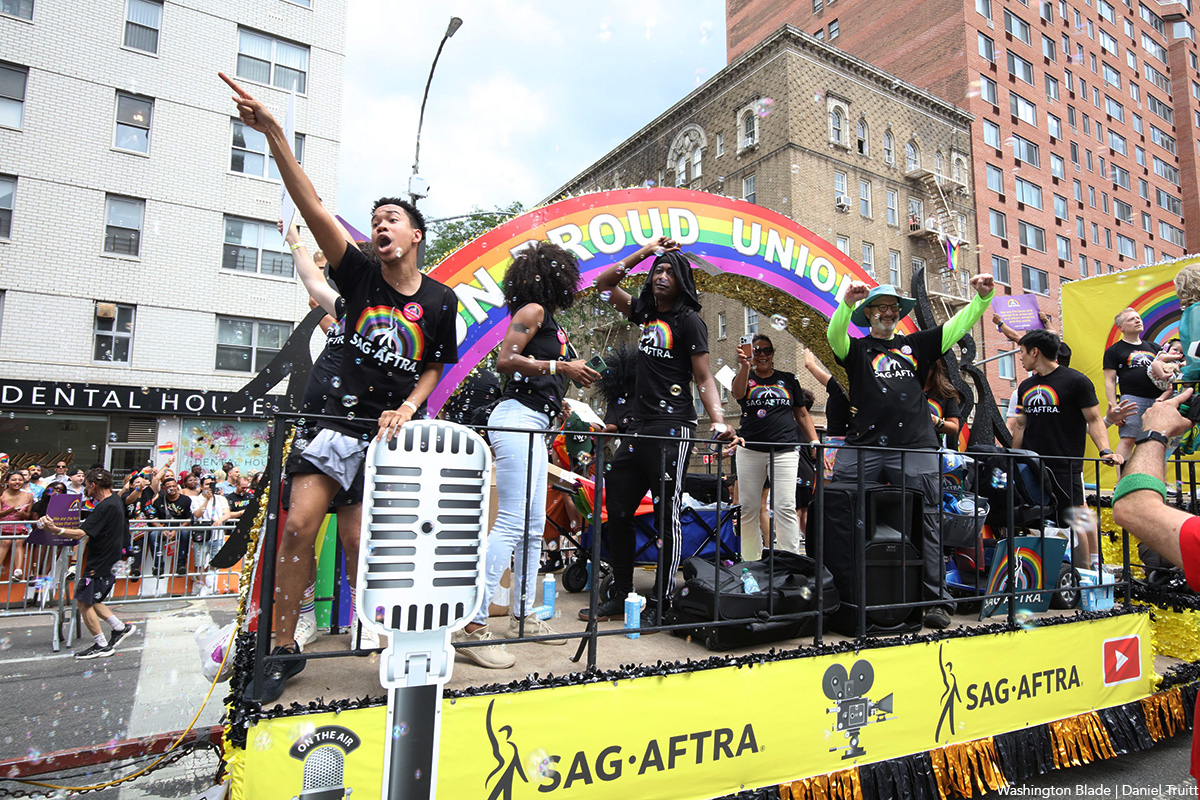
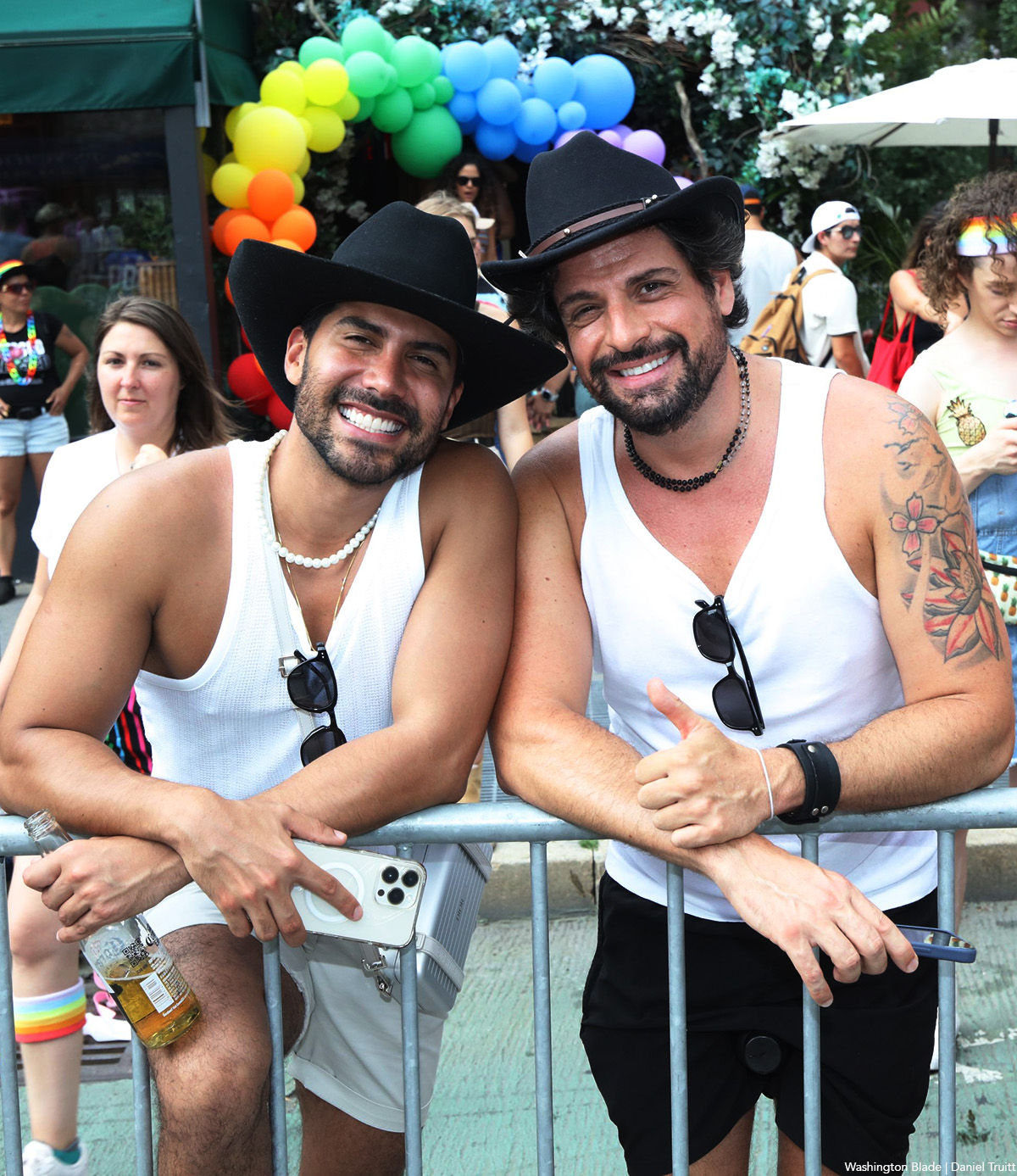
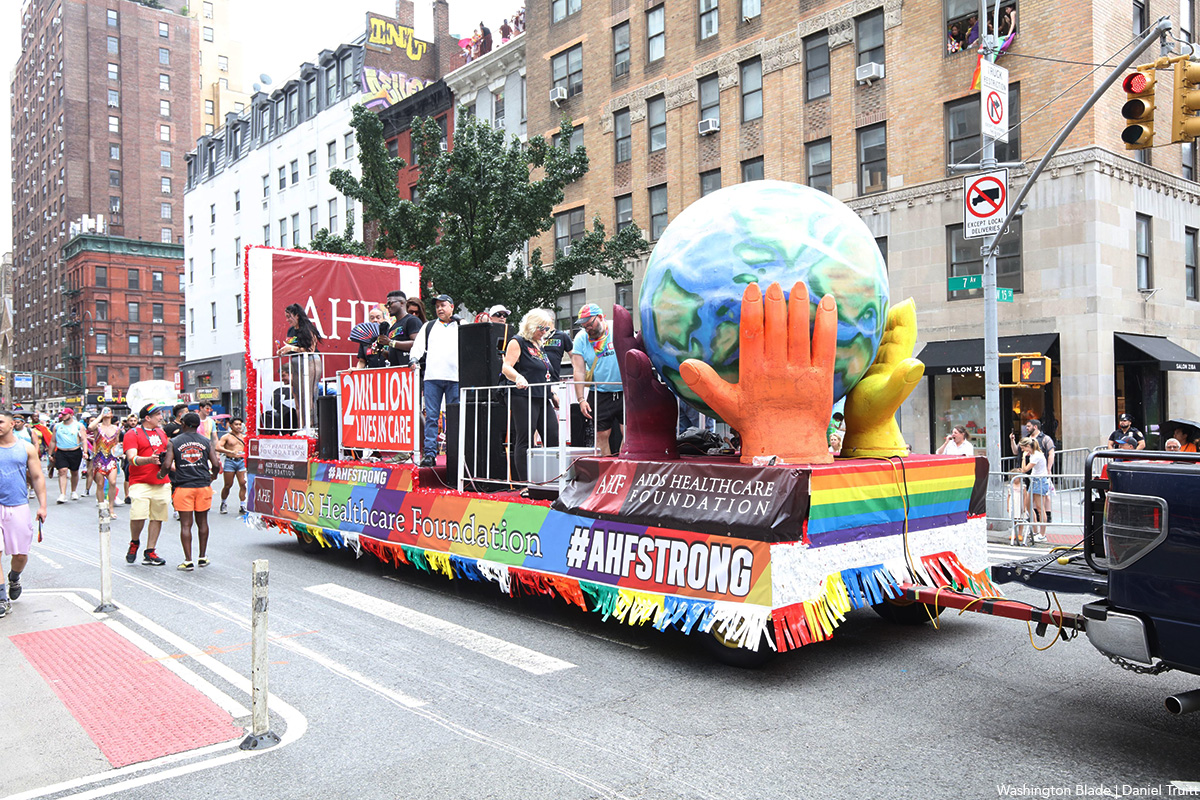
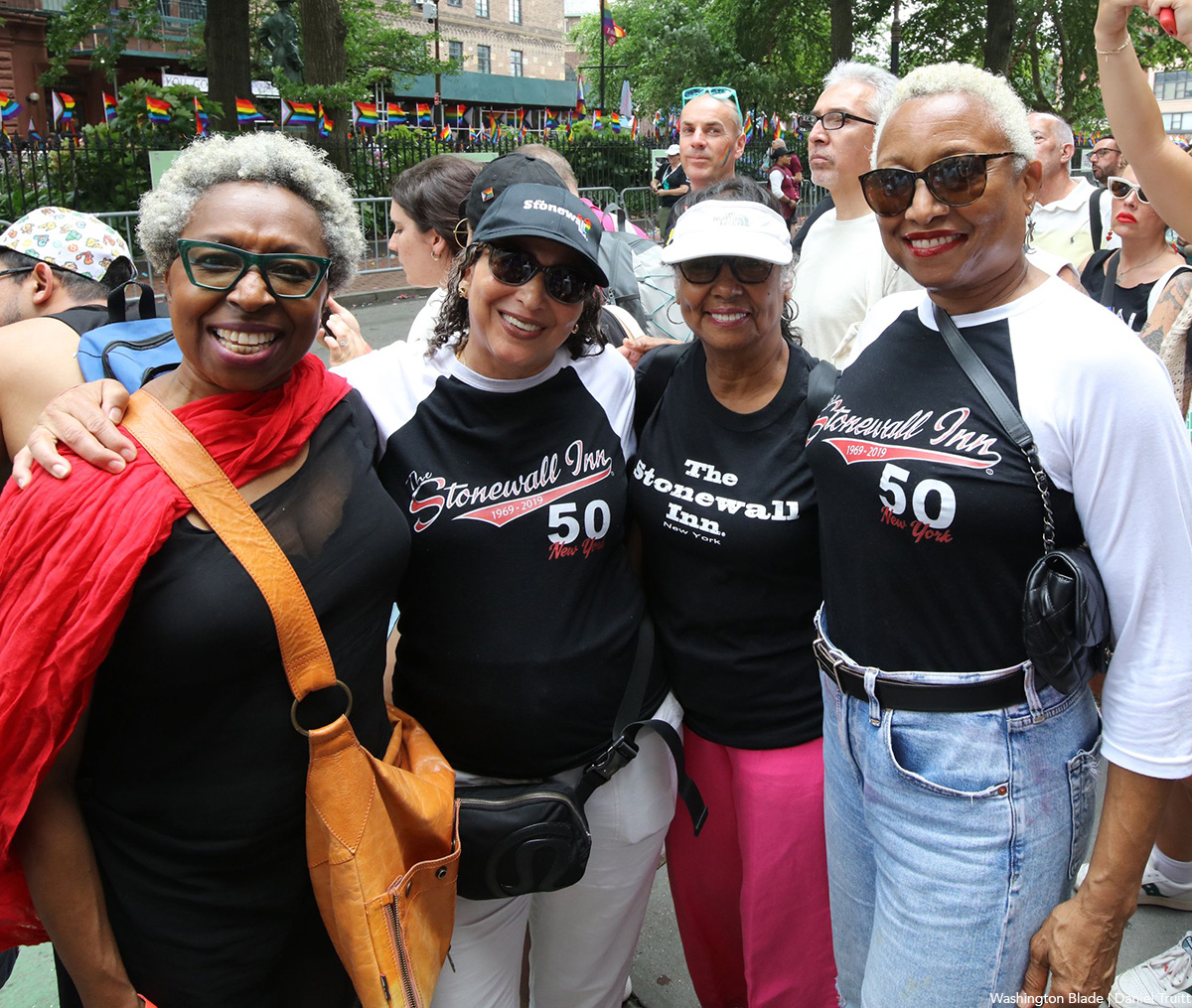
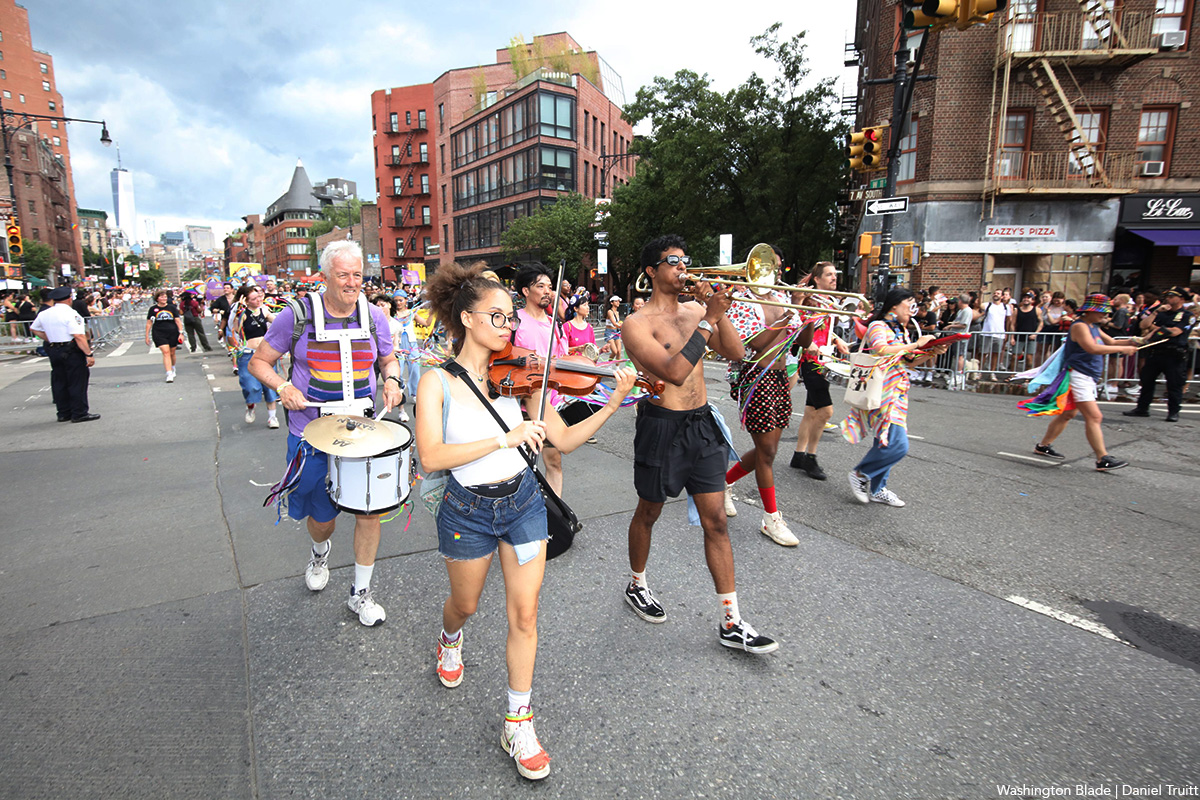
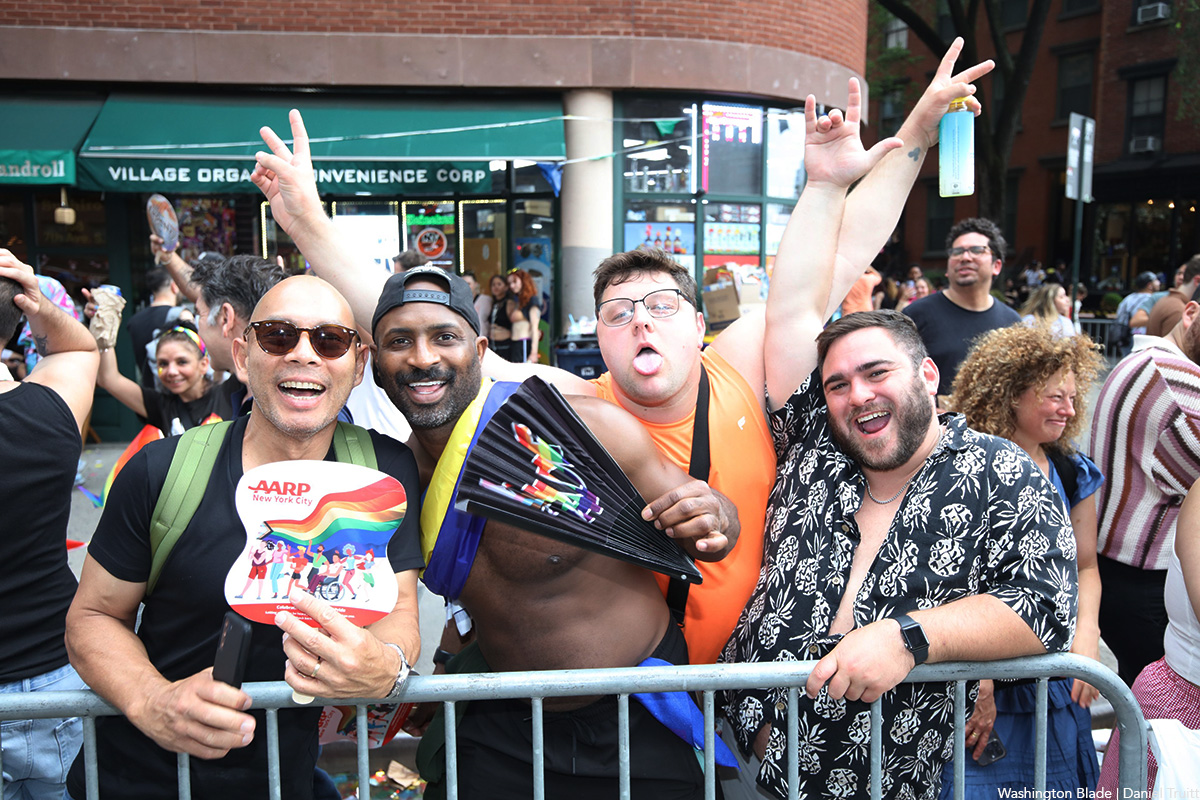
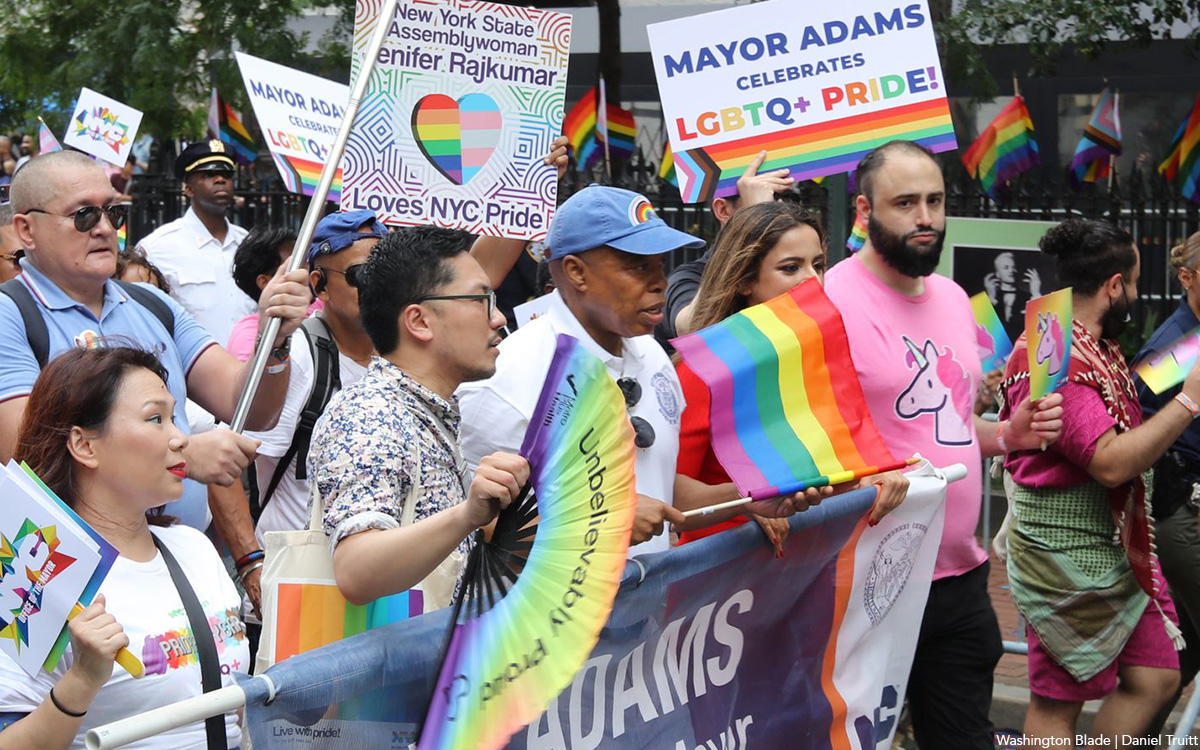
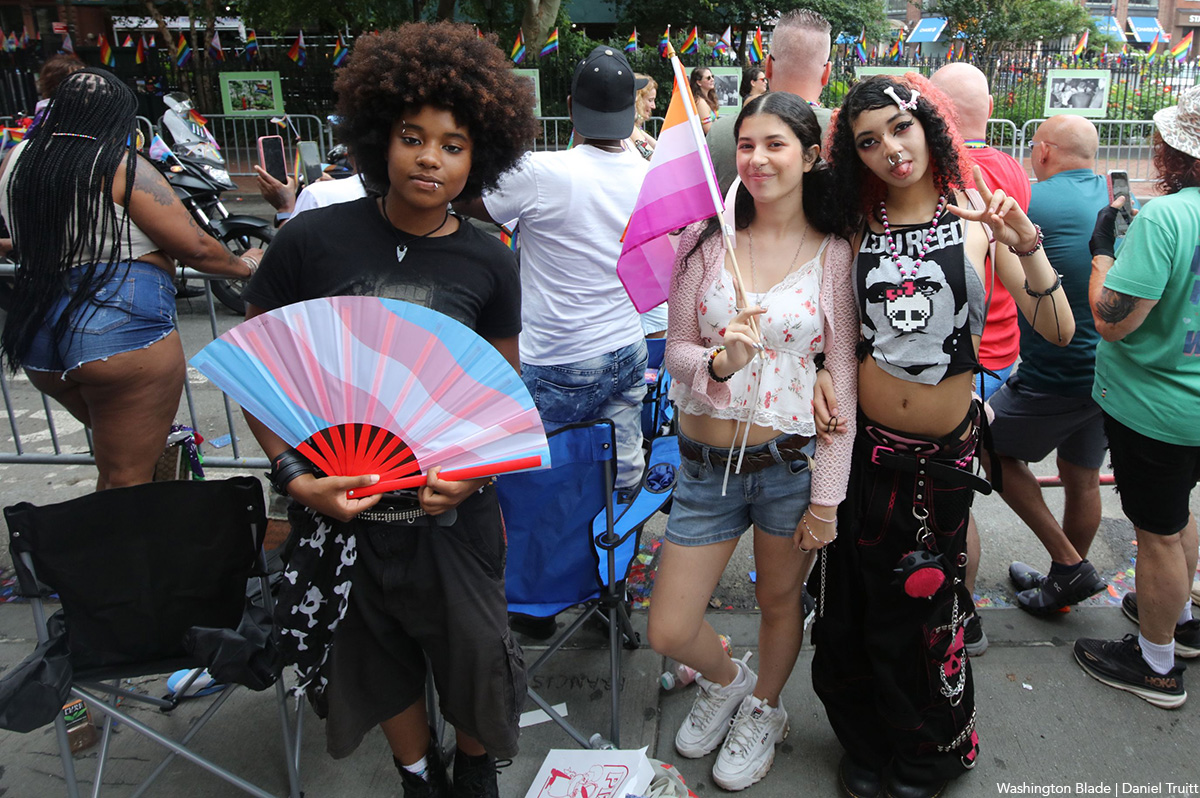
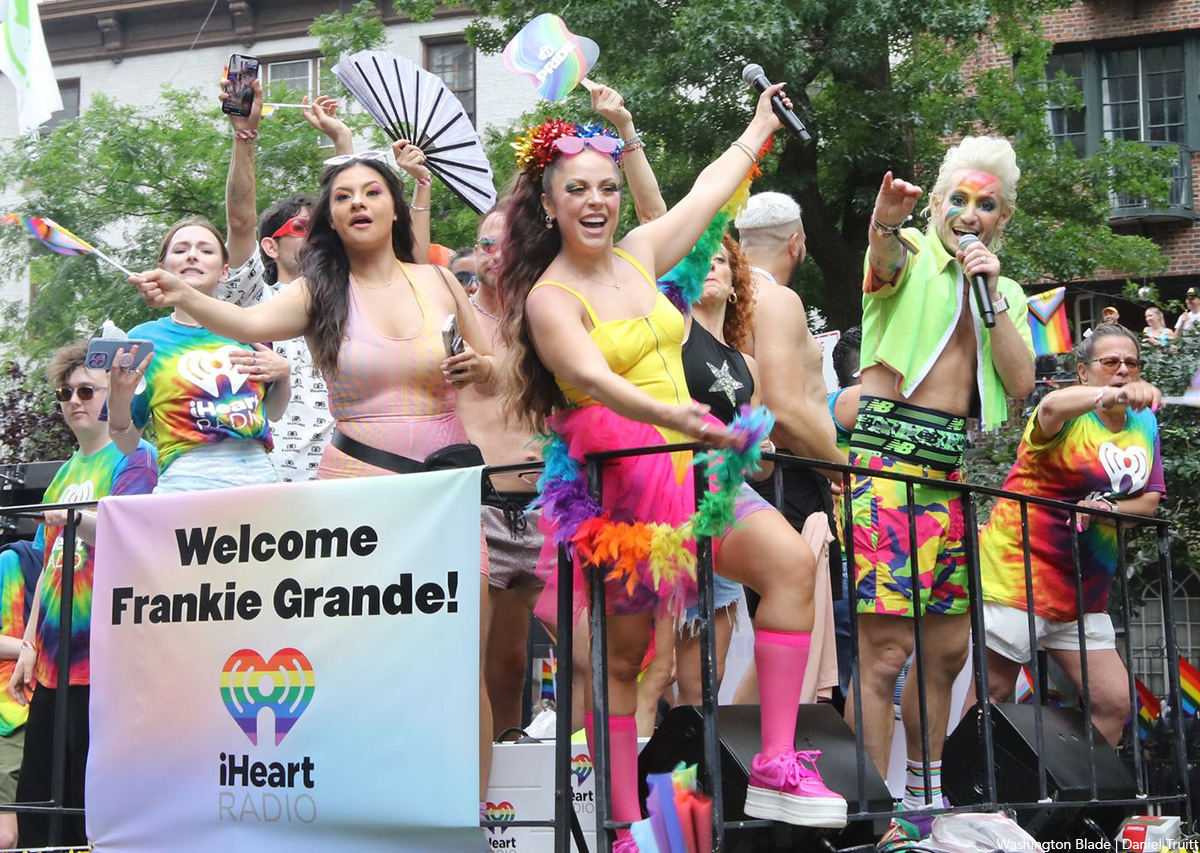
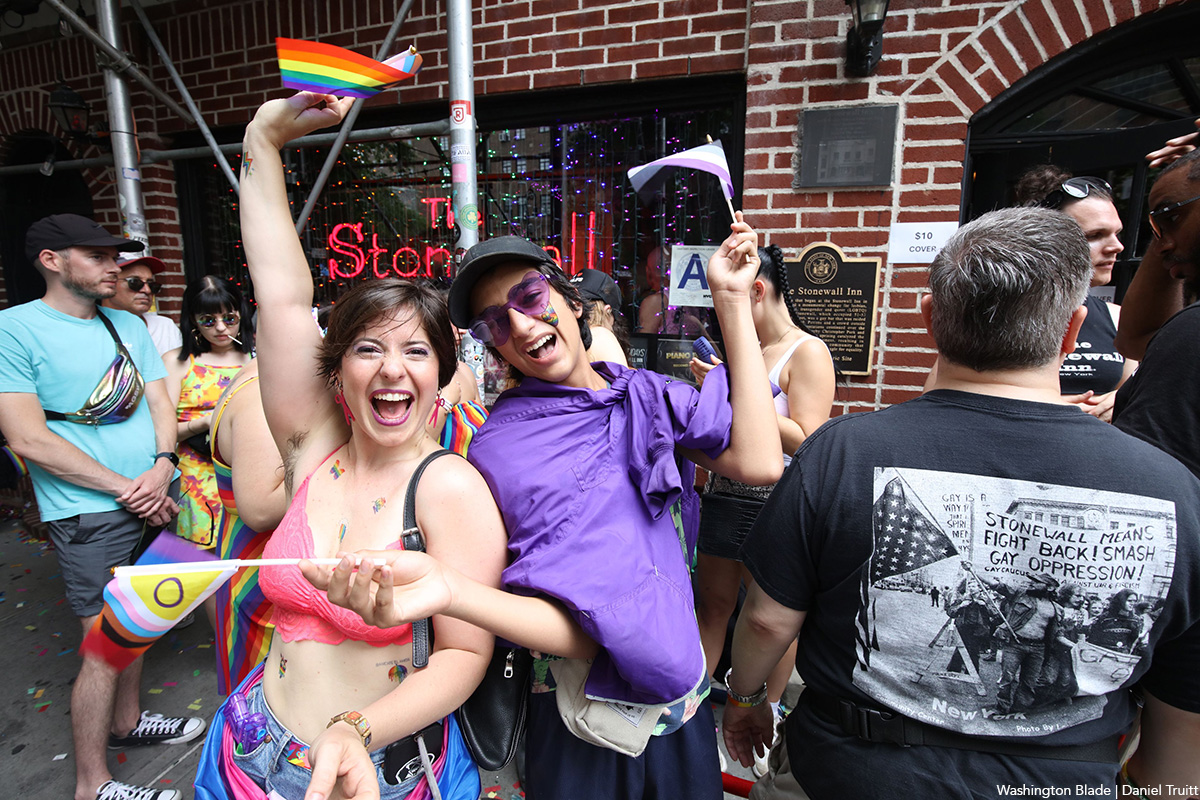
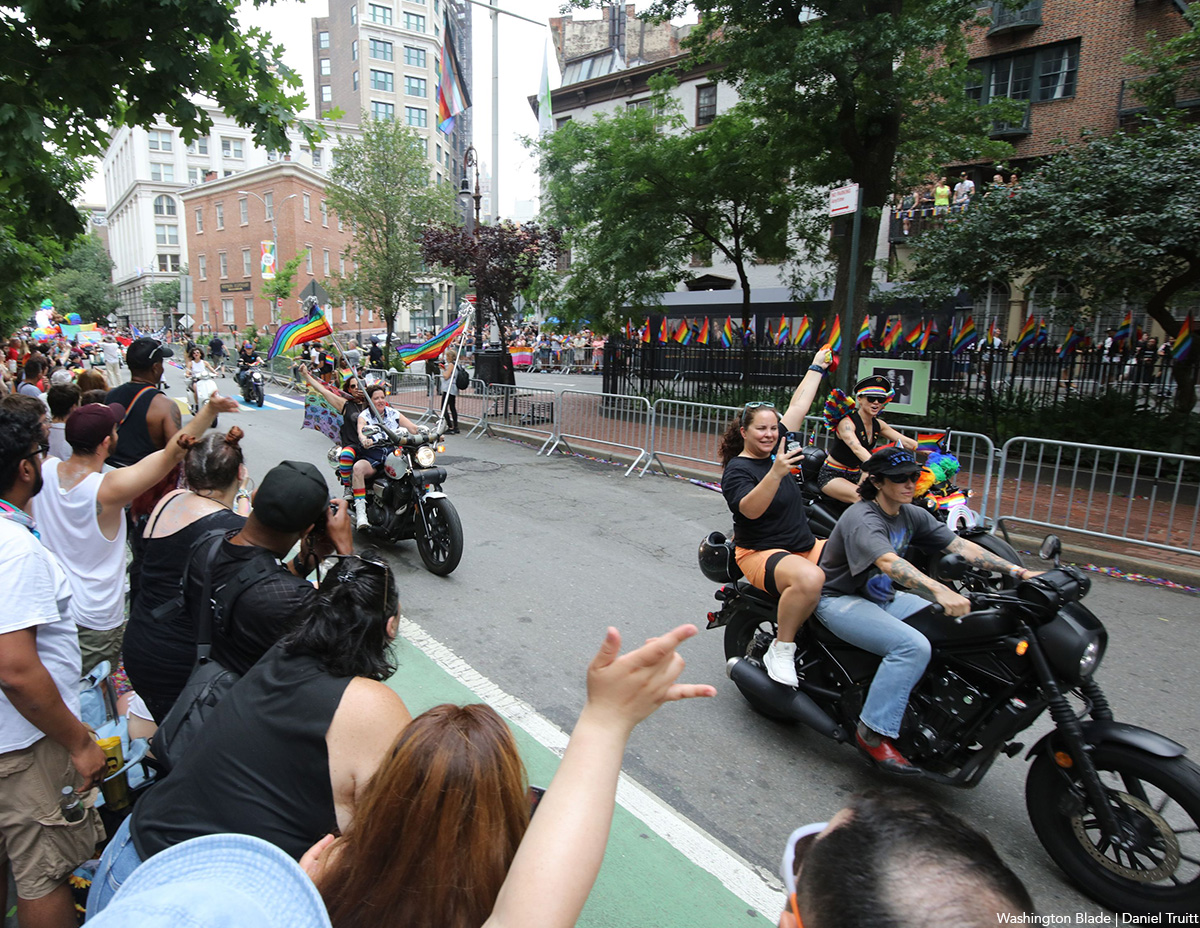
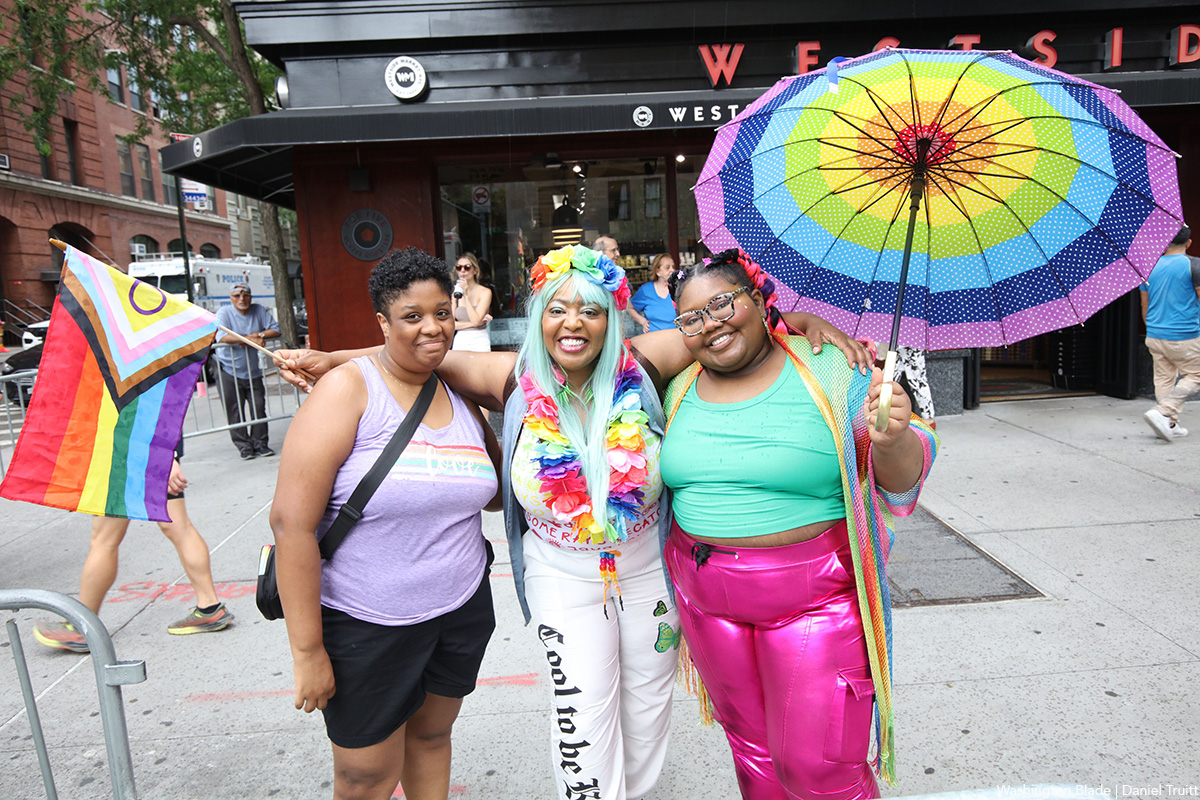
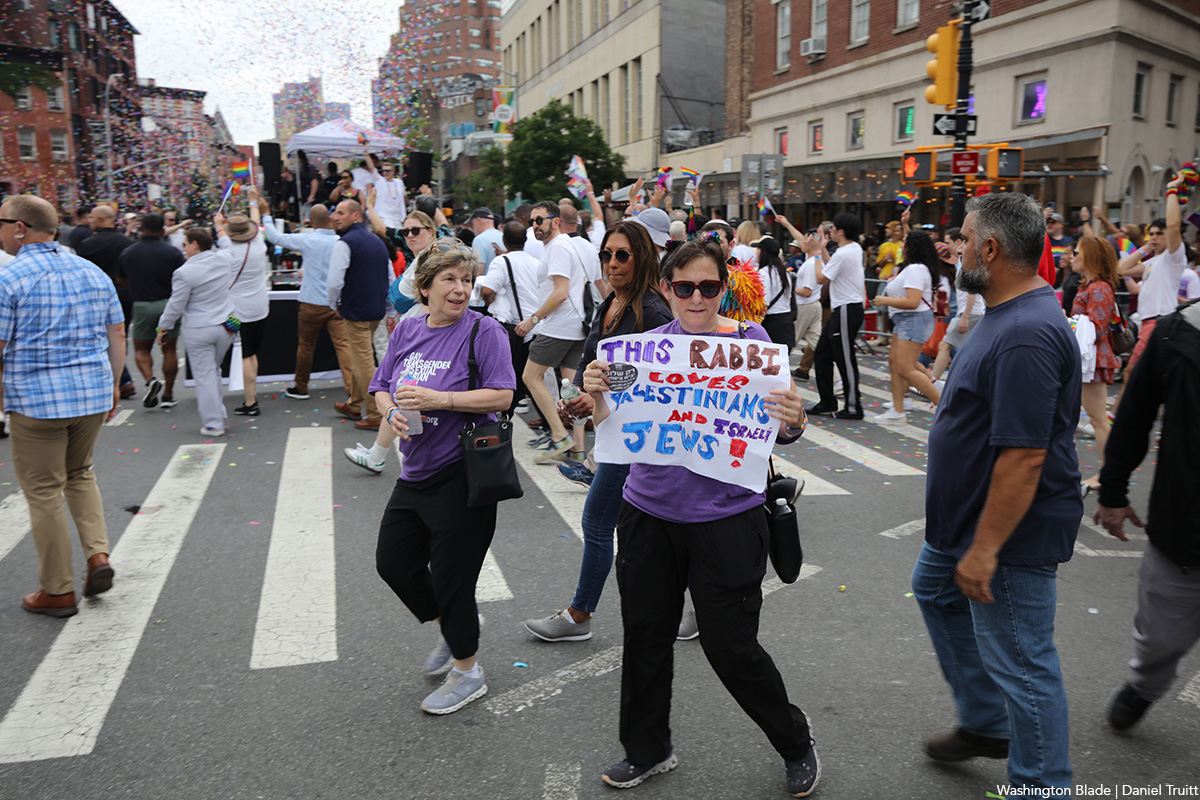
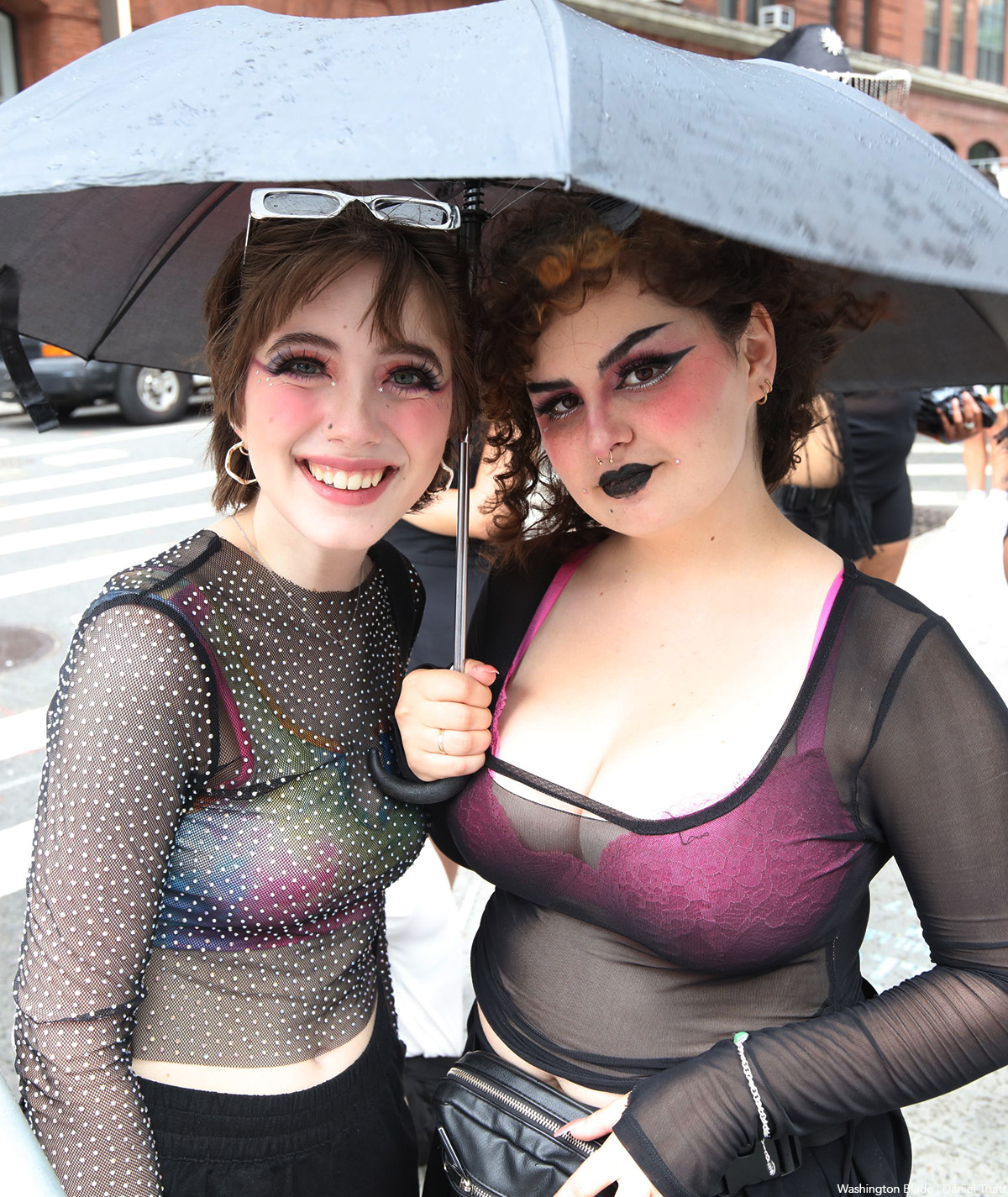
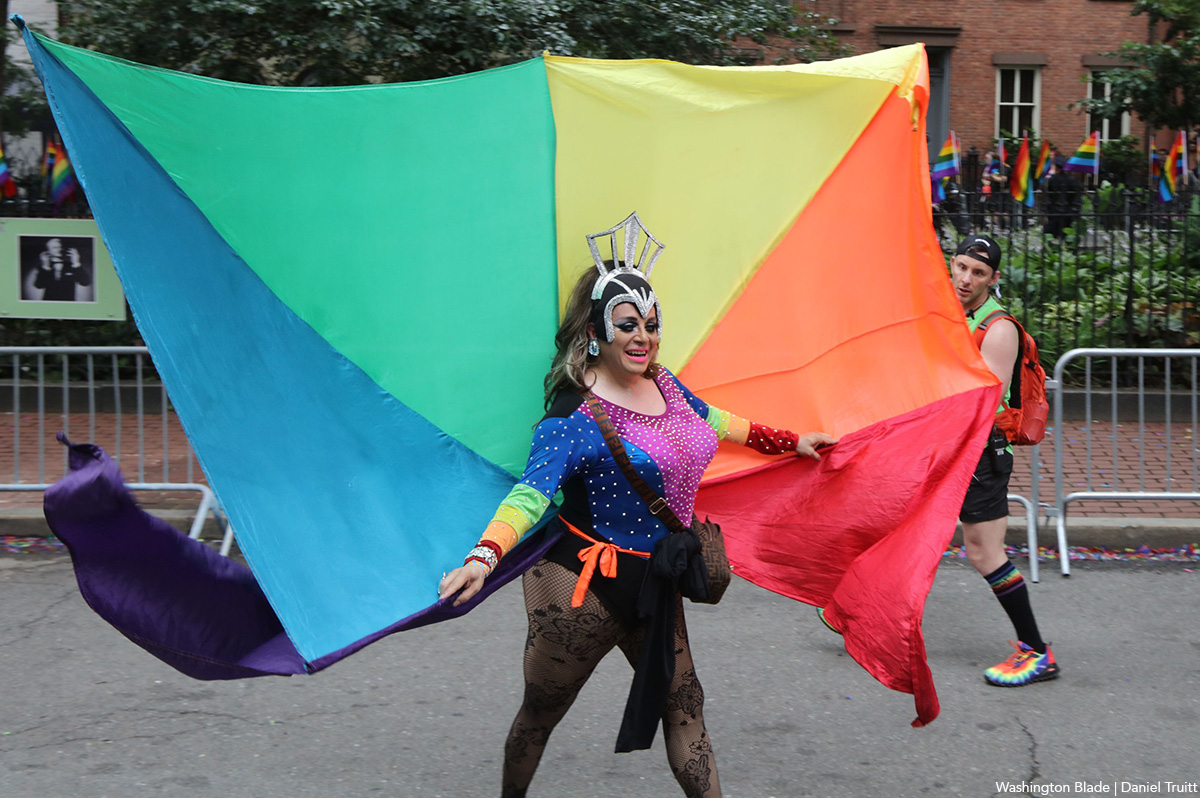
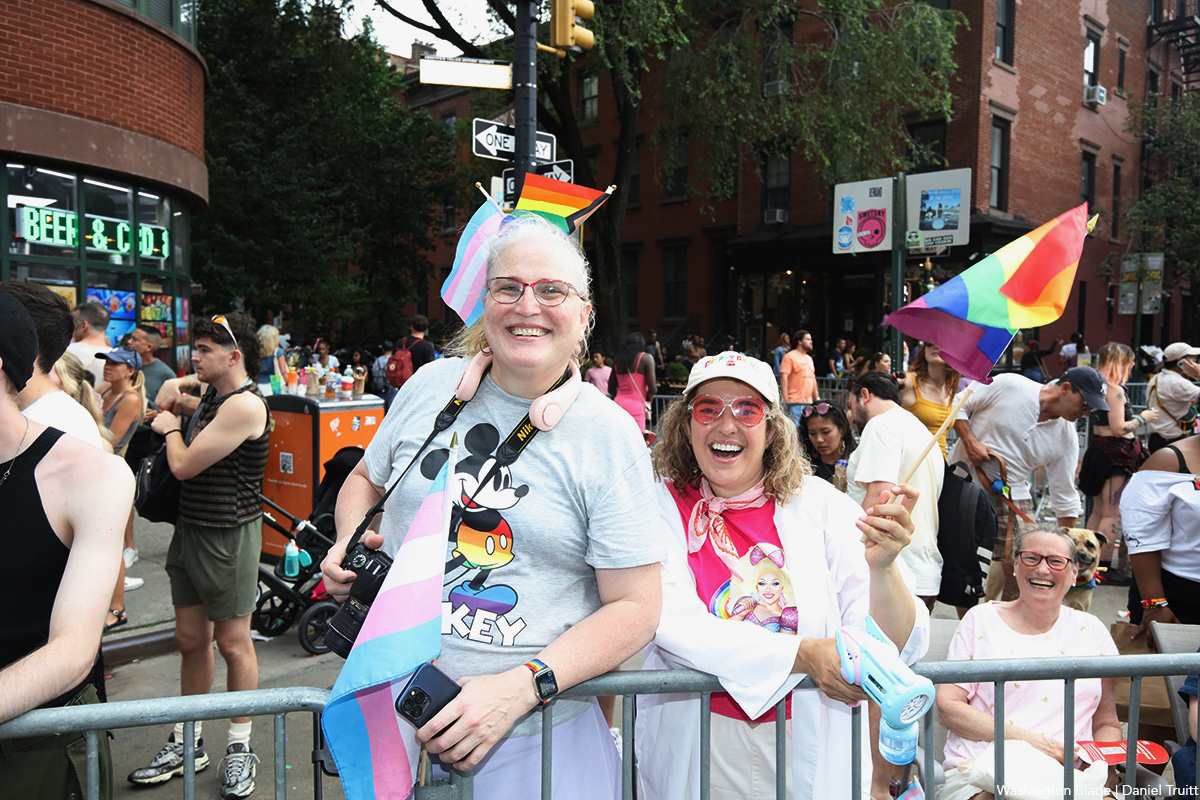
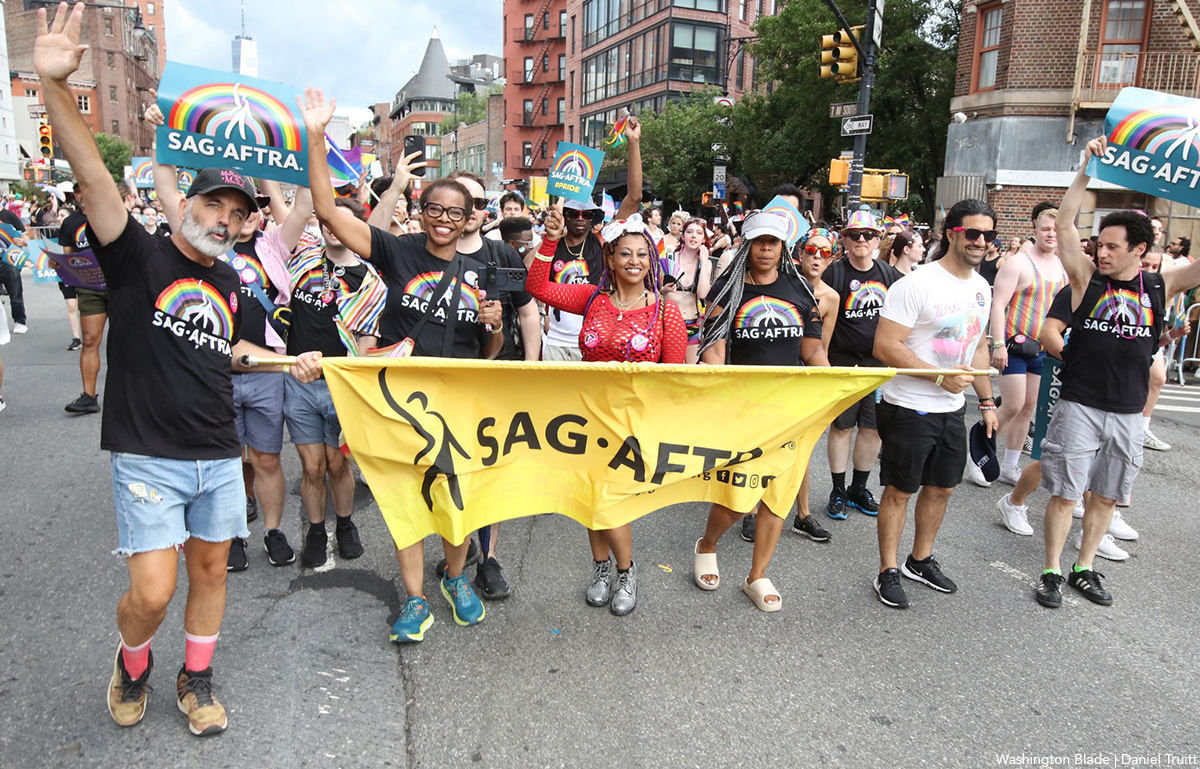
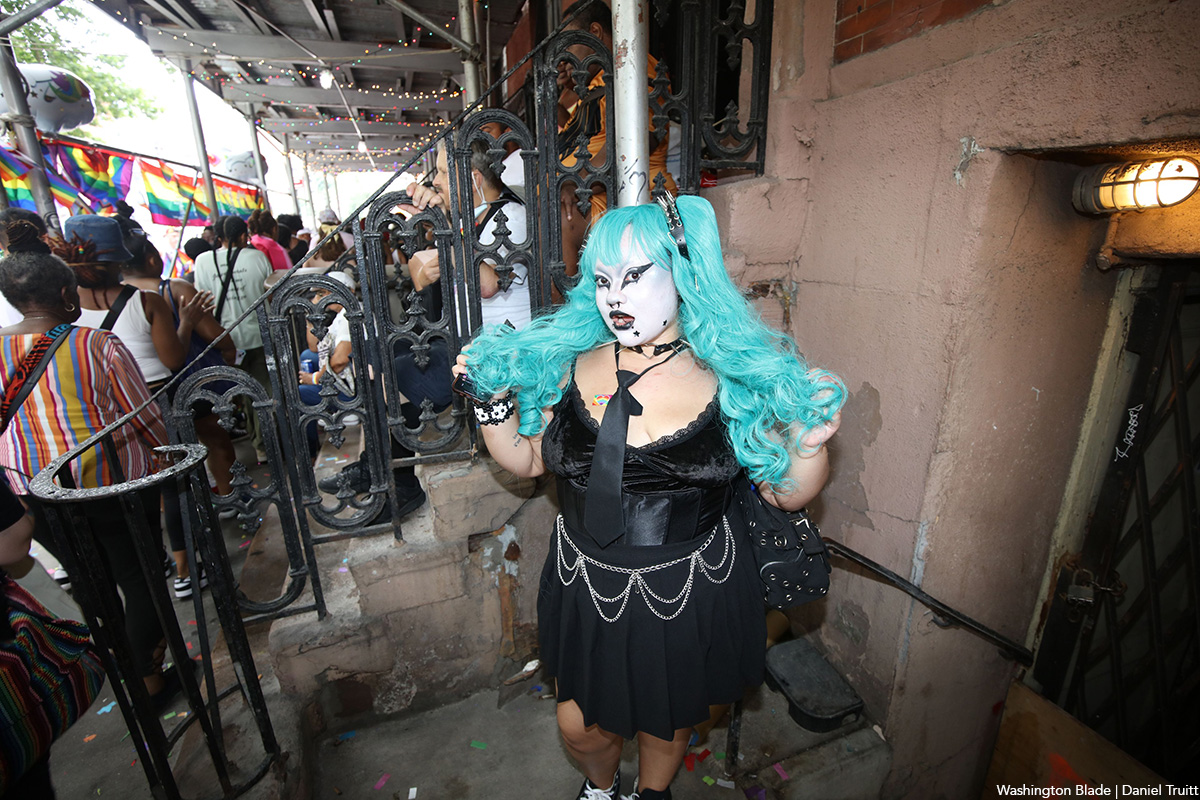
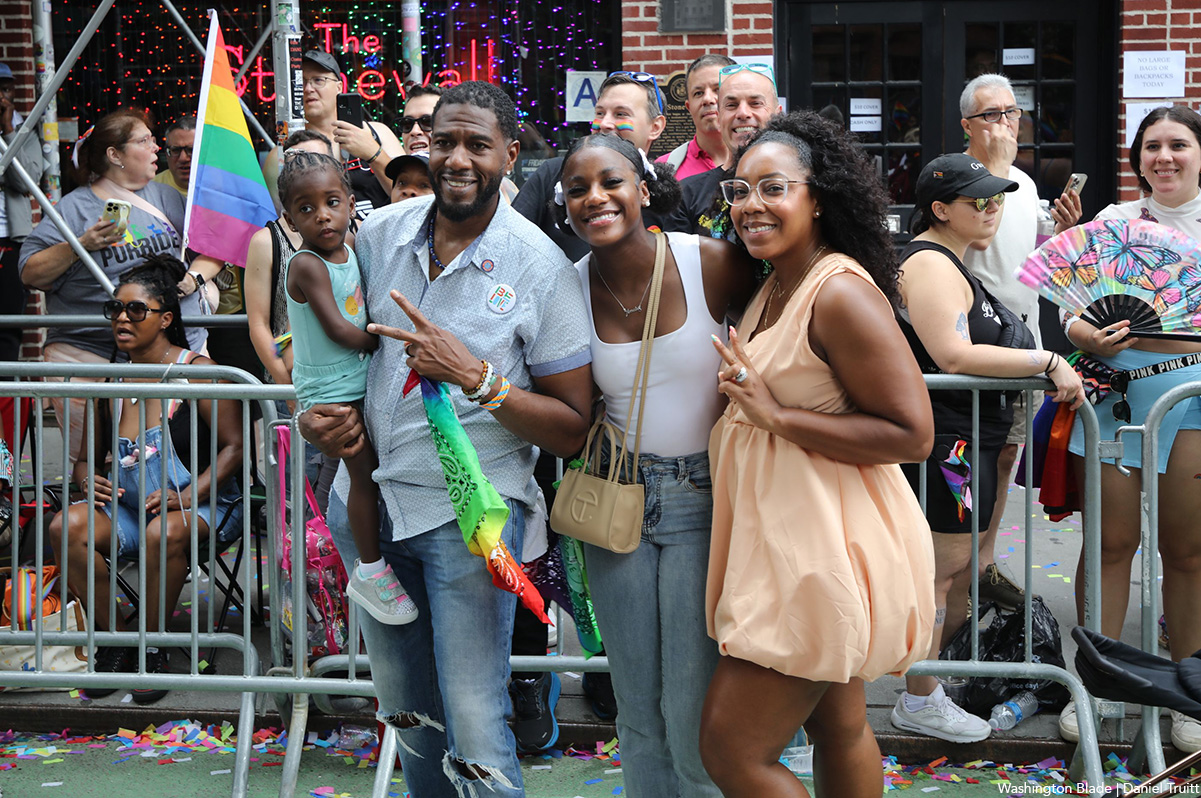
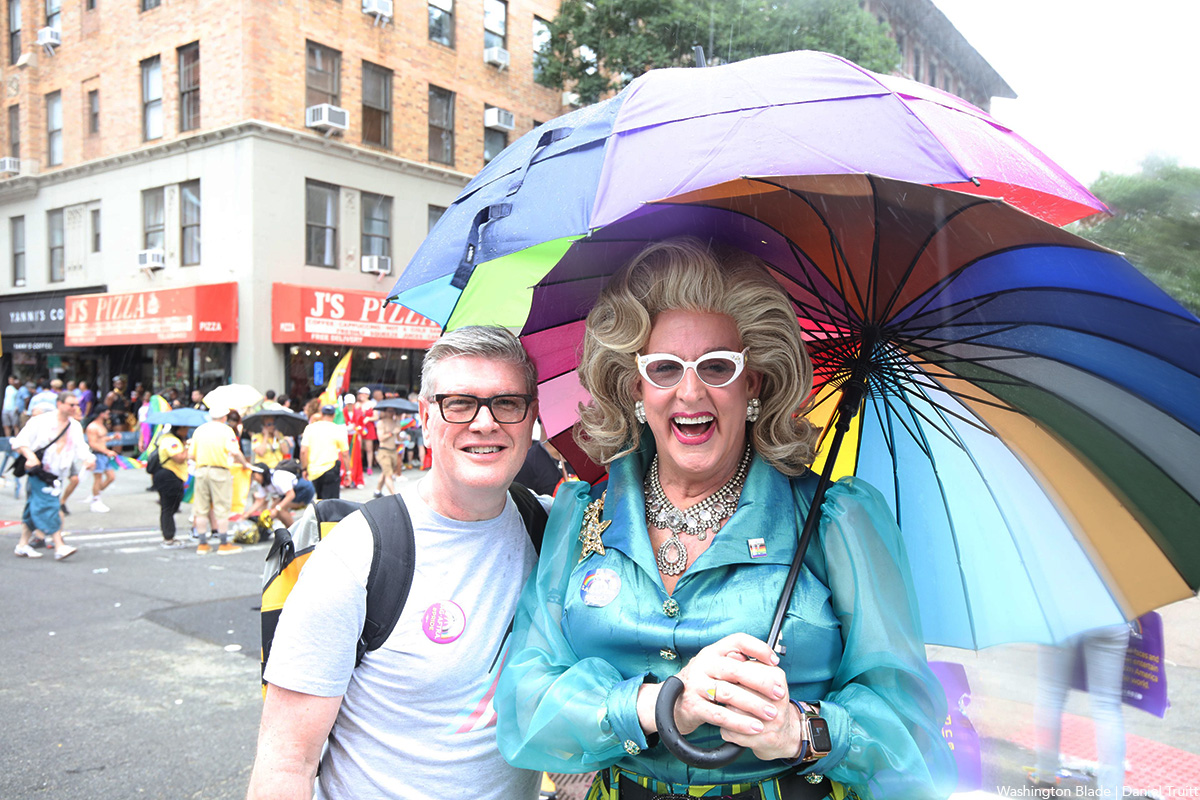
-

 Canada2 days ago
Canada2 days agoToronto Pride parade cancelled after pro-Palestinian protesters disrupt it
-

 Theater5 days ago
Theater5 days agoStephen Mark Lukas makes sublime turn in ‘Funny Girl’
-

 Baltimore4 days ago
Baltimore4 days agoDespite record crowds, Baltimore Pride’s LGBTQ critics say organizers dropped the ball
-

 Sports4 days ago
Sports4 days agoHaters troll official Olympics Instagram for celebrating gay athlete and boyfriend


